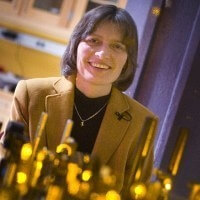News
January 25, 2010 - The Department of Defense (DoD) announced that Lene Hau, Mallinckrodt Professor of Physics and of Applied Physics, was among the 11 distinguished university faculty scientists and engineers forming the 2010 class of its National Security Science and Engineering Faculty Fellowship (NSSEFF) program.
Hau will use the support to investigate quantum information science.
NSSEFF provides grants to top-tier researchers from U.S. universities to conduct unclassified, basic research that may transform DoD’s capabilities in the long term.
“These distinguished researchers have a demonstrated record of success in fields of strategic importance to the DoD. Their NSSEFF work will not only contribute to preparing DoD and the nation for an uncertain future, but will also develop the necessary high quality science, technology, engineering and mathematics talent that will be essential to the department’s continued success,” said Zachary J. Lemnios, director, Defense Research and Engineering.
The fellows conduct basic research in core science and engineering disciplines that are expected to underpin future DoD technology development. For this competition, the research proposals are in the areas of high temperature superconductors; resilient networks; synthetic biology; computational electromagnetics; quantum information science; waves in random media; image acquisition, analysis and integration; attosecond electron processes in solids; theoretical and computational design of light and force-driven molecular materials; and emergency of shape and patterns in biomolecular assemblies in ionic solutions.
Lemnios noted that “the NSSEFF Program ensures these research leaders and their students are actively engaged with DoD, in addition to conducting this unclassified research”. Students of NSSEFF Fellows will also be afforded opportunities to present to DoD audiences and to further develop and broaden their research experiences through internships at DoD laboratories.
In response to the NSSEFF Broad Agency Announcement issued by the Air Force Office of Scientific Research, 800 nomination letters from academic institutions resulted in the technical review of 670 white papers. Twenty-one semifinalists were selected from the authors of these white papers, and invited to submit full proposals outlining their research plans. Upon successful completion of negotiations between their home academic institutions and DoD, grant awards will be made to the faculty members’ universities for support of their research.
In Hau’s laboratory, light has been slowed 100 million fold to speeds of only 10 miles/hour. Light pulses can be stopped and extinguished in one part of space and then revived at a completely different location. In the process light is converted to matter and back. The matter copy of the light pulse can be grabbed, moved around, reshaped, and turned back into light. In the most recent experiments, the matter copy was stored away for 1.5 seconds. This is long enough for light to go from Earth to the Moon!
Hau was elected to the American Academy of Arts and Sciences on April 20, 2009; was honored with Harvard University's prestigious Ledlie Prize in September 2008; and was elected to the Royal Swedish Academy of Sciences (site in Swedish) on January 16, 2008.
In addition, she was selected by the MacArthur Foundation as one of only 9 MacArthur Fellows to be featured in connection with the 25th anniversary of the MacArthur Fellows program. The Library of Congress has recognized Lene Hau in its "Women Who Dare" 2007 desk calendar of accomplished women from around the world and throughout history.
Adapted from the original press release from the United States Department of Defense.
Topics: Applied Physics
Cutting-edge science delivered direct to your inbox.
Join the Harvard SEAS mailing list.
Scientist Profiles
Lene V. Hau
Mallinckrodt Professor of Physics and of Applied Physics



